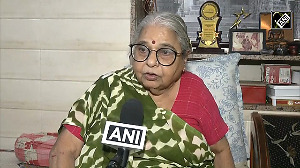"Bangalore should be a global city, the cultural capital of the new economy and a microcosm of the globalised world," declares Bangalore-born Mohandas Pai.
As a board member of Infosys, he is the archetypal concerned corporate citizen who would if he could change the world with his ideas and zeal.
Pai, a highflier in the software giant (he is still just under 50), has a zen for cities. As human resources head of Infosys he is constantly scouting around in India for newer destinations where the company can set up shop to beat rising costs. And he is all the time benchmarking these against the world¿s great cities to develop an agenda for change and betterment.
He is full of ideas on how to turnaround Kolkata and uplift Bhubaneshwar, but naturally his most elaborately worked out ones are for Bangalore which has in the recent years climbed in global fame even as it has descended deeper into civic mess.
Pai is furious that "those who are not Bangalore-born have robbed it of its identity by renaming it Bengaluru."
And he spells out that identity instinctively. It has been and will remain predominantly Kannada-speaking, but it has and must remain "cosmopolitan" too. "It should have an environment which attracts the best and the brightest, become what Calcutta was to the rest of the country in the 19th century."
Bangalore's advantage in evolving as a city of the future is that it carries rather a light historical baggage. It doesn't have much of either the old or the new rich. The software boom being barely a decade old, the city is for the most part an "overgrown town". Plus, it lacks a community of creative people, no great arts tradition.
So how can Bangalore go about building itself up? The best way is for it to be made into a city state. India is a country in transition where power has gone to the bottom of the pyramid, "causing decisions to be determined by the lowest common denominator." Hence the bad governance.
But since politicians are not going to accept the idea, the second best solution is for it to have a mayor with a five-year term and full autonomy to deliver results and be answerable. Powerful mayors with political standing are the norm in great cities across the world like New York, Shanghai and London.
But there is also another problem. Today, most of the educated middle class has very little interest in civic affairs. Governance can improve only when the right kind of councillors can get elected, and that can happen only if educated and concerned citizens take an active lead. "Citizens' groups have to become much more proactive and there should be many organisations like Janaagraha."
On the all-important issue of the city's traffic problem, there is a need to learn from Beijing which has built eight concentric ring roads over 15 years. This helps disperse the population which takes care of the problem of congestion. It also enables people to live closer to where they work. "We need new developments with living and working spaces near to each other."
This kind of dispersal has already taken place in an area like Whitefield and is taking place in north Bangalore as a result of the new international airport coming up - residential development in Yalahanka and commercial development in Devanahalli. "In Infosys, we do not employ people who live too far away from their place of work."
Another critical area is transport. The key lies in going multi-modal -- underground metro, metro bus and private transport. People should be able to come to the metro station by bus or car, leave the car at a car park and then use the metro. This is common in many cities, notably Boston. Pai also has an almost revolutionary idea -- "make Bangalore a walking city. All great cities in the world are -- Singapore, London, Hong Kong, New York, all expect Los Angeles."
Environmentalists who will love him for the "walking" suggestion will take some of it back on hearing the next for "tall buildings", albeit with adequate setbacks and parking lots. "The residential complexes have to be linked to the business districts by underground metro. We need high density housing and high density public transport. A big problem with Bangalore is BDA (Bangalore Development Authority)" which has aimed to give individual housing plots to citizens.
Pai's solution for the city's cultural deficit is for "enlightened billionaires like Azim Premji, Nandan Nilekani, Kiran Mazumdar Shaw, N C Menon to donate for the arts so that museums, art galleries and performing arts centres can be built."
To make Bangalore's infrastructure happen, Pai does not see a serious problem of resources. The former CFO is quick with numbers. The city's 500 million sq ft of built-up space can yield an annual revenue of Rs 500 crore at an average annual property tax rate of Rs 10 per sq ft. And every year 2 million sq ft of quality space is getting added. So resources are not the problem, governance is.






